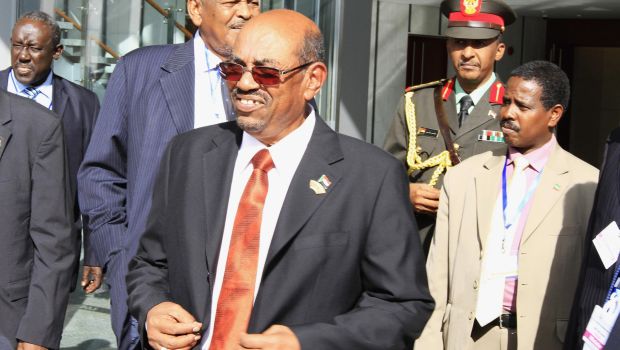
Sudan’s President Omar al-Bashir leaves after the Extra Ordinary session on the Assembly of Heads of State and Government of the African Union on the case of African Relationship with International Criminal Court (ICC), in Ethiopia’s capital Addis Ababa, October 12, 2013 (REUTERS/Tiksa Negeri)
Khartoum, Asharq Al-Awsat—Sudan’s ruling National Congress Party (NCP) is facing a major internal split following the decision to suspend a number of its leading members.
Thirty-one NCP members signed a petition at the end of September calling for an investigation into the killing of peaceful protesters by security forces, and demanding political reform.
The group included the head of the NCP’s parliamentary bloc, Ghazi Al-Attabani.
As a result of the petition, President Omar Al-Bashir formed a disciplinary committee, headed by parliamentary speaker Ahmed Al-Tahir, to investigate the issue. The committee decided to suspend the membership of all group members until its investigations were concluded.
The group, whose members refused to appear before the committee, called the suspension illegal. Hassan Rizq, a leading member of the party, told Asharq Al-Awsat that members of the group received notification of their suspension on Sunday and Monday.
He said the decision was an attempt to deflect attention away from the main issues and cause division within the NCP and the Islamic movement.
Rizq added that although the decision was illegal, “the suspension gives us more freedom, and the NCP has nothing to do with the petition, so why does it interfere? We have sent a petition to the president of the republic, not the president of the NCP, and the demands we made are guaranteed by the constitution.”
Usama Tawfiq, another petition signatory, told Asharq Al-Awsat that all options were open to the group, including forming a new political organization. He warned that there were more reformists within the NCP than the leadership is aware of, adding that the reformist ranks are continuing to swell.
A source within the group, speaking to Asharq Al-Awsat on the condition of anonymity, said the decision to suspend members had caused a serious crisis and may lead to the collapse of the regime, because the leaders of the group had great influence on the party and its leadership, which could lead to mass resignations that would further weaken the government.
Senior Islamist leader Ghazi Al-Attabani, who is widely seen as the leader of the group, said on his Facebook page that the committee was “not fit for its purpose,” and was not impartial.
He said: “It is astonishing that leaders of the NCP pay so much attention to this matter while they ignore the problems of the country which threaten its unity and even its existence.”
“What this shows is that some leaders of the NCP are unhappy with any opposing views even if they came from within the party,” he added.
Attabani also accused the party leadership of failing to foster unity within its ranks, and of deviating from its core principles.
He added that the group would focus on what he described as “positive action,” and that they did not consider the issue of NCP membership to be of importance to the public. He also promised to present political initiatives to unite the nation and find solutions for the country’s problems.
